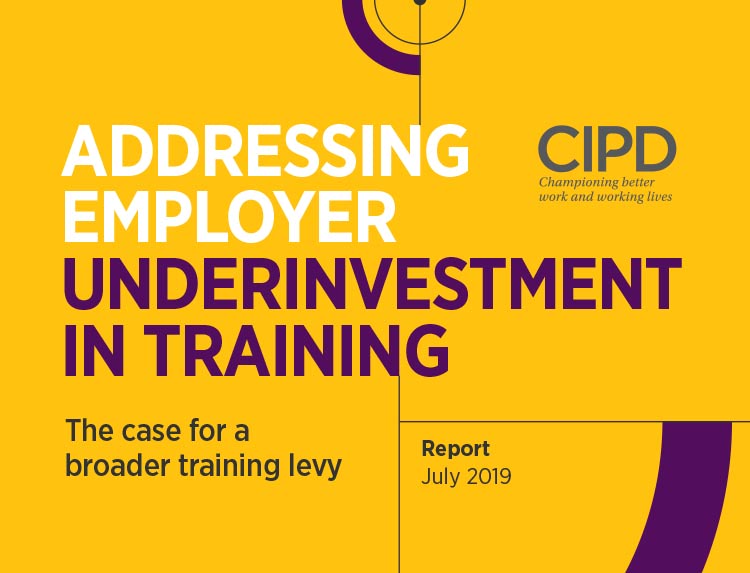Apprenticeship Levy has failed to increase investment in workplace training and needs urgent reform

New research underlines case for a more #flexible training levy
The Government made an empty promise when it said the apprenticeship levy would boost the amount of money employers spend on workplace training, a new report from the CIPD, the professional body for HR and people development, finds.
Addressing employer under-investment in training – the case for a broader training levy reveals that fewer than a third (31%) of levy paying employers say the levy will lead them to increase the amount they spend on training. This is down from 45% in July 2017, showing confidence in the levy has dwindled since it came in.
The report, based on survey data from 2,000 employers, also shows that nearly six in ten (58%) of levy paying employers either believe the levy will either have no impact on the amount of money they spend on training (49%), or will actually lead to a reduction in training spend (9%).
The key objectives of the levy were to increase apprenticeship numbers and boost investment in workplace training, which was in a 20-year decline when it was introduced in April 2017.
However, the report finds that the levy has failed on both these counts.
As well as not boosting skills investment in most workplaces, the levy has meant employers have invested in fewer apprenticeships with starts falling from 509,400 in 2015/16 to 375,800 in 2017/18.
And of further concern is that the research shows the design of the current levy is incentivising employers to use their funds in counterproductive ways:
- A fifth (22%) of the 2,000 employers surveyed said they use their levy money on training which would’ve happened regardless
- 15% say they use the scheme to accredit skills which staff already have
- 14% of employers report the apprenticeship levy has had the effect of directing funds away from other forms of training that are more appropriate for their organisation
In light of the report’s findings, the CIPD is calling for the apprenticeship levy to be replaced with a broader training levy. This would enable organisations to fund both apprenticeships and other forms of accredited training which are better suited to their needs.
The CIPD also wants the levy to cover all employers with a headcount of 50 or more to double the amount raised by the levy to £5 billion, which would help to make up the shortfall from the decline in investment over the last two decades.
A portion of the training levy fund could also be used to create a regional skills fund to address skills challenges at a local level, such as helping smaller non-levy paying firms to invest in skills by providing better business support.
Lizzie Crowley, skills adviser at the CIPD, said:
“Our research clearly shows the apprenticeship levy has failed to deliver what the Government said it would: more investment in workplace training.
“For this to become a reality, we need to have a broader training levy that is much less prescriptive and gives employers more flexibility. This should also help to prevent employers from gaming the system as is currently the case.
“With only 2% of employers required to pay the apprenticeship levy, the money raised from it was never going to be enough to close the gap that’s been left by the long-term decline in training investment. Bu if we had more employers contributing, we could make up the shortfall and also help to boost regional investment in skills.”

Kirstie Donnelly, Managing Director, City & Guilds Group, said:
“In February, we highlighted that the apprenticeship budget set by the Treasury fell well below the amount of levy money collected by HMRC, meaning the Government would never have been able to fulfil its promised funding for employers.
“The apprenticeship levy was supposed to help stimulate employer interest and investment in apprenticeships. Yet in the first year of its operation, just 8% of the levy was spent. City & Guilds’ own research earlier this year – Flex for Success – found that 95% of levy-paying employers were not able to spend their full allowance in the first year, so the CIPD report is further reinforcement of those findings and our report’s call for reform to create greater flexibility in how the levy is used. This is a message that the Government has been hearing for some time now – but are they actively listening?
“It is clear that employers are only making the most of their levy when they feel that they can make the choices that best suit their environment and are able to direct the levy accordingly.
“The answer is for the Government to apply more “carrot” and less “stick” and give greater flexibility to employers in the apprenticeship system, allowing them to exercise choice – within a clear set of parameters – in how they spend the levy. We need a system built on an agreed “collective endeavour” around how apprenticeships are driven but then also apply more trust and freedom in the way employers can operate.
“Apprenticeships are key to unlocking economic and social prosperity as we face a pivotal moment in our country’s history and its future. The Government needs to actively listen to research and insights from employers and act now in order to help fix these issues and build an apprenticeship system that works for all and in which all employers want to invest.”

Ben Rowland, Co-Founder of Arch Apprentices, offers a different perspective:
“How quickly should the biggest transformation of skills policy ever introduced take to bed in properly? Our view at Arch is that two years is not enough. The shift demanded of employers and training providers by the apprenticeship levy is huge, not just in terms of delivery but of mindset too. So we look at these stats through a different perspective: in fact we are amazed at just how quickly the levy has been adopted, especially given the dire predictions made by many at the time the levy was introduced.
“In particular, our own analysis of the Government’s data shows that the drops have mainly been in those apprenticeships that were previously criticised for their poor quality and or low relevance to the future economy, and that there has been a 220% rise in high level apprenticeships since the levy was introduced, in future facing occupations like data analysis and software development. Our view is that such a massive change is having teething problems, but in fact fewer than one would expect – and that the underlying direction of travel is both robust and exciting.”
The CIPD surveyed 2,182 HR professionals and senior decision-makers with fieldwork undertaken between 21st March 2019 and 18th April 2019. The figures have been weighted and are representative of UK business by size, sector and industry.











Responses